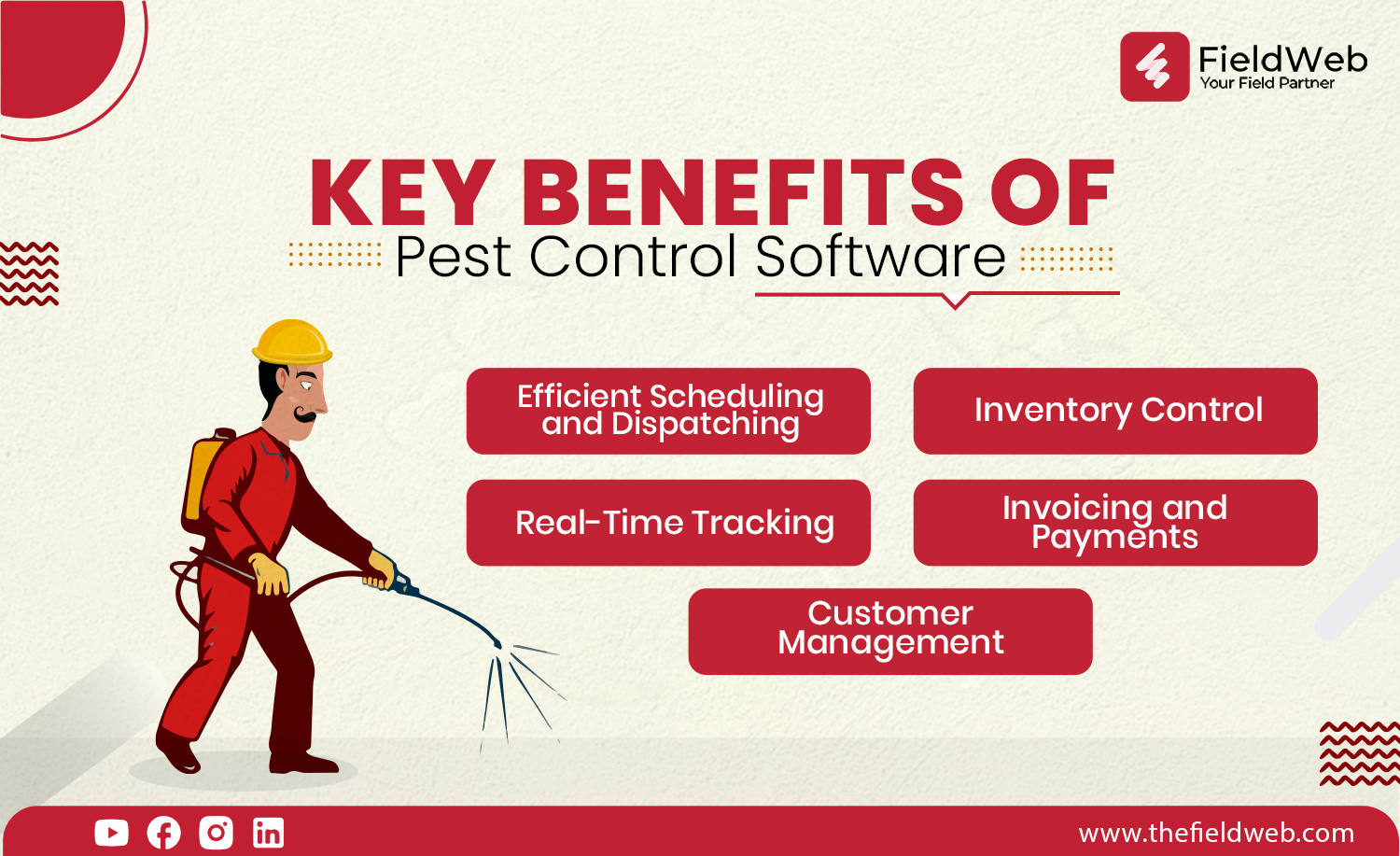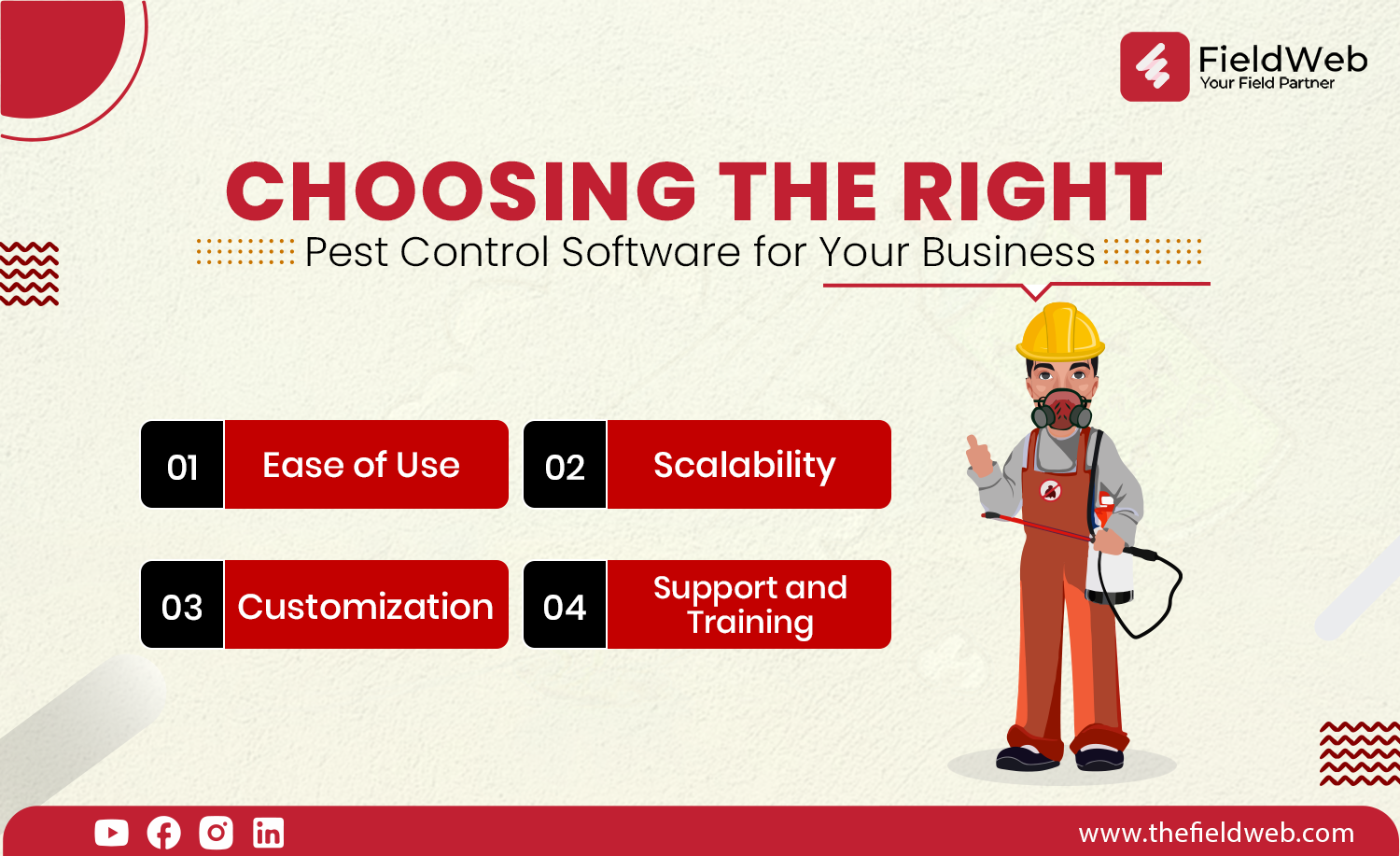FieldWeb Blog.
Get the knowledge and inspiration you need to run your home and commercial service business better.

In today’s competitive market, small pest control businesses need efficient tools to manage their operations, track technicians, and ensure customer satisfaction. This is where pest control software comes into play. These software solutions help small businesses streamline their operations, manage appointments, track inventory, and maintain a clear communication channel with customers.
In this blog, we will explore the key features to look for in pest control software and highlight some of the best options available for small businesses.
Small businesses, particularly in the pest control industry, face unique challenges. Managing a mobile workforce, scheduling appointments, tracking inventory, and ensuring timely service delivery can be daunting without the right tools. Pest control software addresses these challenges by providing a centralized platform for managing all aspects of your business. This not only improves operational efficiency but also enhances customer satisfaction and drives business growth.

Automating the scheduling process is crucial for small businesses where every minute counts. Pest control software allows you to assign jobs to the most suitable technician based on factors like proximity, availability, and expertise. This ensures that your team is deployed efficiently, reducing travel time and increasing the number of jobs completed per day. Automated dispatching also minimizes the risk of double-booking or missed appointments, keeping your operations running smoothly.
Real-time tracking is a game-changer for managing a mobile workforce. With pest control software, you can monitor the exact location of your technicians throughout the day. This feature not only allows you to ensure that your team is on track but also enables you to provide accurate ETAs to customers, improving their experience. Additionally, real-time tracking can help in optimizing routes, saving fuel costs, and reducing overall travel time.
A detailed customer database is essential for delivering personalized service and building long-term relationships. Pest control software allows you to maintain comprehensive records of each customer, including service history, preferences, and communication logs. This information is easily accessible to your team, enabling them to tailor their approach based on the customer's needs and past interactions. For instance, if a customer prefers a specific technician or has certain pest control concerns, this can be noted and acted upon in future visits.
Keeping track of your inventory is vital to avoid delays and ensure your technicians have the necessary tools and materials for each job. Pest control software provides an inventory management system that allows you to monitor stock levels in real-time. You can set up alerts for low stock, automatically reorder supplies, and track the usage of materials on each job. This helps in maintaining an uninterrupted workflow and prevents the inconvenience of running out of essential supplies during a service call.
Streamlining your billing process is essential for maintaining a healthy cash flow, especially for small businesses. Pest control software simplifies invoicing by generating bills automatically once a job is completed. You can customize invoices to include all relevant details, such as services provided, materials used, and any applicable discounts. The software also supports various payment methods, making it easier for customers to pay on the spot or online. Automated reminders can be sent to customers for pending payments, reducing the likelihood of overdue invoices and improving overall financial management.
By implementing pest control software, small businesses can overcome the common operational challenges they face and position themselves for growth. The centralized management of scheduling, tracking, customer relations, inventory, and billing helps small businesses operate more efficiently, deliver better customer service, and ultimately increase profitability. Whether you're just starting out or looking to scale your operations, investing in the right pest control software is a smart move that can yield significant returns.
Managing a pest control business without field service management (FSM) software can be fraught with challenges. These difficulties not only affect operational efficiency but also impact customer satisfaction and overall business growth. Here’s a look at some common challenges faced by pest control businesses operating without FSM software:

Without FSM software, scheduling and dispatching can become a chaotic and error-prone process. Manual scheduling often leads to:
This inefficiency not only reduces the number of jobs completed but also affects customer satisfaction due to delays and missed appointments.
Real-time visibility is crucial for managing a mobile workforce. Without FSM software:
Managing customer information without FSM software can lead to:
Effective inventory management software is critical for pest control operations. Without FSM software:
Handling invoicing and payments without FSM software can be problematic:
Handling invoicing and payments without FSM software can be problematic:
FieldWeb is an all-in-one Field Service Management (FSM) software designed to cater to the needs of small pest control businesses. It offers a user-friendly interface and a range of features that help businesses manage their operations efficiently.
Key Features:Jobber is a popular choice for small service-based businesses, including pest control companies. It offers a range of features that help businesses manage their day-to-day operations effectively.
Key Features:ServiceTitan is another robust FSM software designed for service-based businesses, including pest control companies. It offers advanced features to help businesses manage their operations and grow.
Key Features:When selecting pest control software for your small business, it’s important to consider your specific needs and budget. Here are some factors to keep in mind:

Investing in pest control software can significantly improve the efficiency and profitability of your small business. By automating routine tasks, improving customer communication, and providing real-time insights, these tools enable you to focus on what matters most—delivering exceptional service to your customers. Whether you choose FieldWeb, Jobber, ServiceTitan, or another solution, the right software can be a game-changer for your pest control business.